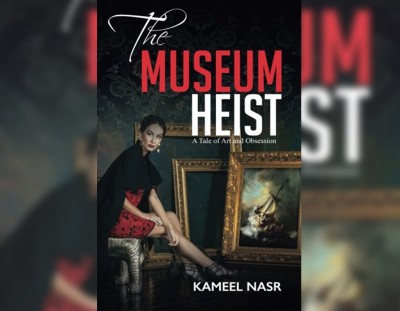
Frustrated by the cold-case status of what was arguably the greatest art robbery in history, author Kameel Nasr decided to create a fictional tale of what he believes happened at the Isabella Stewart Gardner Museum in 1990 in his newest book, “The Museum Heist.” Although the book was released in August 2015, Nasr is now advertising it around Boston, the home of the heist, and will host a book reading and signing Wednesday evening at the Harvard Coop in Cambridge.
Nasr was born in Beirut, Lebanon, and his family moved to the United States when he was seven years old to settle in San Francisco.
“We really acclimatized very fast, my brother and I, to America,” Nasr said.
As an adult, Nasr became an avid bicyclist and traveled to several different countries. He said the simple form of transportation helps people truly experience another country’s culture.
“You see the city, but the city isn’t where the culture is,” Nasr said. “It’s really out in the outlying lands where you see how people live. It really gives you an appreciation for our life in general and gives us an understanding of different cultures.”
Nasr uses his book profits to fund his charity, The Curiosity Foundation, in order to promote tolerance.
“I wanted to help people who want to bicycle abroad and do some good work,” Nasr said.
Nasr struggled with dyslexia during his childhood, and as a result, he dedicated himself to language and read the entire Random House paperback dictionary from cover to cover. The first book he ever read was “Autobiography of a Yogi” by Paramahansa Yogananda, which led him on a spiritual journey that contradicted his Lutheran upbringing.
“It just wasn’t what I read, it was [an] entirely different world and it set me on this spiritual path to want to find out more,” he said. “[I wanted] to sit through mediation, to go to Zen Buddhists [and] to go to all these different swamis to hear about all these different philosophers — Christian as well as Eastern.”
Nasr was driven to learn about life, which also helped with his writing.
“I loved to write because writing was a discovery, a process to discover about yourself and discover what you really feel about things,” Nasr said. “So it’s almost a meditation, writing.”
His newest book, “The Museum Heist,” is a novel based on the infamous Isabella Stewart Gardner Museum art robbery. In March 1990, two men robbed the museum of several masterpieces that still have not been found or returned. Intrigued, Nasr decided to write his own fictional take on what happened.
“The fact that it hasn’t been returned just makes the whole thing a mystery,” Nasr said. “[That] makes it ripe for someone like me, who likes the story, to come up and make up a story about it.”
The story of the heist intrigued Nasr, especially considering the monetary value of the stolen art pieces.
“It was huge, that is, in money terms,” Nasr said. “It’s worth like half a billion dollars. It makes it like the granddaddy of all museum heists, and it [still] hasn’t been solved. There were a lot of crimes bands involved, [and now] there’s a very big reward.”
Although the heist took place 16 years ago, it is still in the news. In December 2015, according to The Boston Globe, the FBI raided Suffolk Downs, a racetrack, to search for the missing paintings. Their daylong search yielded nothing.
There are many theories about what happened to artwork, but Nasr has his own opinion.
“It’s definitely thugs that stole it,” he said. “These were kind of low-level people.”
He added that he believes crime gangs are often romanticized, but in reality, they are just “petty thieves with cash problems getting enough money to fill their car with gasoline.”
A few years ago, the FBI claimed to have solved the case, but something about it seemed suspicious to Nasr.
“I felt sure they weren’t [caught] because they didn’t release any of the names,” Nasr said. “I felt sure that [the police] didn’t know who did it, and so I went full speed ahead on this book. [I thought], ‘They’re not going to solve the case, so why don’t I do it in fiction?’”























































































































